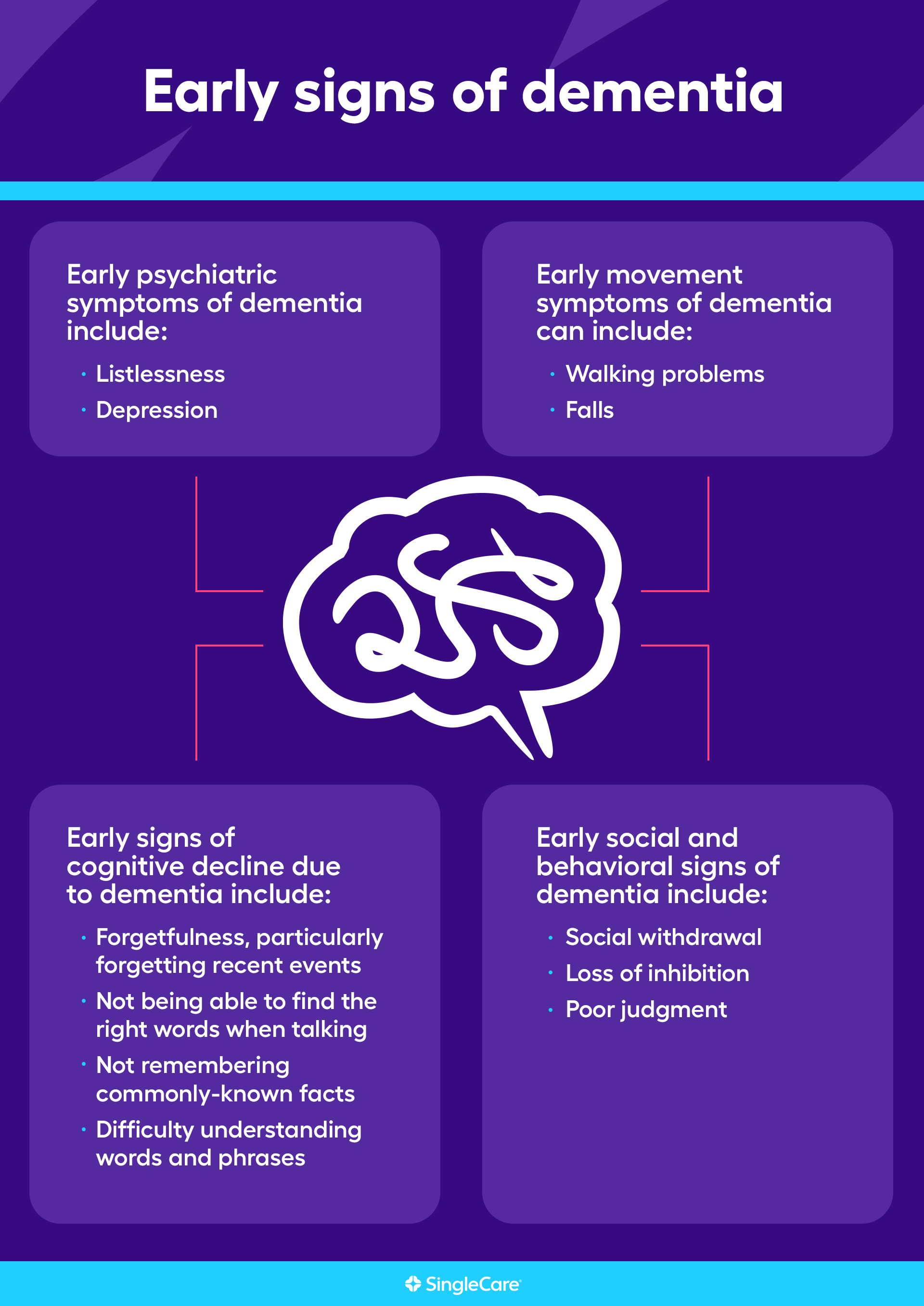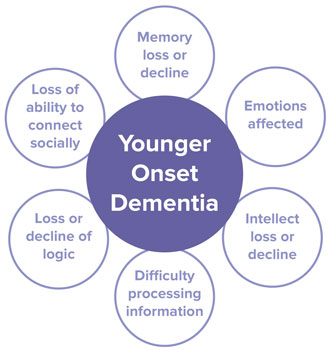Can Early Onset Dementia Be Slowed with Lifestyle Changes?
Can Early Onset Dementia Be Slowed with Lifestyle Changes?
Blog Article
Comprehending the Influence of Dementia on Day-to-day Live and Caregiving
Dementia affects day-to-day live in profound ways, impacting not simply those identified but likewise their caretakers. As cognitive decrease advances, you might notice changes in communication and regular that difficulty both celebrations. Recognizing these shifts is necessary for preserving dignity and interaction. How do you adjust your caregiving methods to sustain somebody traversing this complicated trip? The answers could amaze you as we explore the subtleties of this experience.
The Phases of Dementia and Their Impacts on Daily Life
As you navigate the journey of mental deterioration, understanding its stages can substantially influence how you handle everyday life. Mental deterioration commonly progresses via three main stages: early, middle, and late. In the onset, you may observe periodic memory gaps or problem finding the appropriate words. This can lead to stress, yet recognizing these signs early helps you adapt your routine and seek support.
During the middle stage, you'll experience more obvious cognitive decrease. Daily jobs might end up being tough, and keeping your self-reliance may require changes. Utilizing suggestions and simplifying your environment can help.
In the late stage, individuals typically need significant aid with daily activities. Preparation for treatment becomes necessary, concentrating on convenience and high quality of life. By understanding these phases, you're far better geared up to react proactively, guaranteeing you or your loved one can browse the challenges with dignity and grace.

Modifications in Interaction and Social Communication
Just how do changes in interaction influence your day-to-day communications as mental deterioration progresses? As dementia developments, you could see that basic discussions come to be tough. Words might leave you, or you may battle to locate the right phrases. This can bring about aggravation for both you and your enjoyed ones. Nonverbal signs, like motions or faces, end up being progressively important.
You might locate it much easier to connect with these methods rather than depending solely on spoken language. Paying attention abilities can additionally change; you may discover it more difficult to comply with discussions or remember what was simply said (Vascular Dementia). This can result in misconceptions or sensations of seclusion
Urging patience and creating a helpful setting can help. Taking part in activities that promote connection, like songs or art, can improve social communications. Remember, preserving relationships is still feasible; it's almost adjusting to brand-new methods of communicating.
Influence on Daily Routines and Activities
While maneuvering everyday routines, you'll likely see that tasks you as soon as finished easily come to be much more tough as mental deterioration proceeds. Easy tasks like cooking, clothing, and even bathing might need more time and effort. You may discover on your own neglecting action in acquainted regimens or having a hard time to remember where you placed products. This can bring about stress not simply for you, yet also for those around you.
Adapting your environment can help; for circumstances, labeling products or making use of checklists can streamline tasks. Engaging in repeated, structured activities can also provide convenience and a feeling of success. Bear in mind, it's all right to ask for aid.
Psychological and Behavioral Difficulties
Guiding through day-to-day regimens can produce not just functional challenges, yet also psychological and behavior ones. You might observe changes in state of mind, such as boosted stress and anxiety or irritation, which can stem from confusion or problem in completing tasks. As you browse these minutes, it is vital to acknowledge that your loved one might share their feelings via habits like anxiety or withdrawal.
These emotional responses can be uncertain and may arise without warning, leaving you both feeling overwhelmed. You could find that acquainted atmospheres or regimens can aid decrease stress and anxiety, however preserving persistence comes to be substantial. It is necessary to verify their feelings, also if you do not fully comprehend them.
The Function of Caregivers in Sustaining People With Dementia
As a caretaker, you play a crucial duty in giving emotional support for individuals with dementia. Developing daily treatment routines can create a sense of stability and comfort, assisting to ease their anxiousness. By comprehending their needs and making use of reliable approaches, you can considerably improve their top quality of life.
Psychological Support Approaches
When looking after a person with dementia, comprehending the emotional landscape is important for giving reliable support. You'll usually discover that perseverance and compassion go a lengthy way. Verify their feelings; if they share confusion or frustration, acknowledge it without rejecting their emotions. Basic gestures, like holding their hand or maintaining eye contact, can develop a feeling of safety. Attempt to participate in activities that they delight in, as this can spark delight and link. Bear in mind to communicate plainly and slowly, utilizing a calm tone. Urge expression with songs or art, which can act as a powerful outlet. Ultimately, don't fail to remember to take treatment of your very own psychological demands; seeking support for yourself can enhance your capability to look after them.
Daily Treatment Routines
Developing everyday treatment routines is necessary for giving stability and convenience to people with dementia, as these regimens can help in reducing complication and anxiety. You can start by detailing a consistent routine for dishes, tasks, and rest. This predictability helps your liked one really feel a lot more secure and involved.
Incorporate familiar jobs, like folding washing or watering plants, which can stimulate positive memories and cultivate a sense of success. Use visual hints, such as lists or calendars, to lead them via the day.
Be flexible, though; adapt routines as required based upon their state of mind or power levels. Vascular Dementia. Remember, your persistence and understanding are crucial in steering their transforming needs, ensuring they feel supported and valued throughout their day-to-day life
Creating a Safe and Comfortable Living Environment
Creating a safe and comfortable living setting is essential for individuals with dementia. You'll want to make home safety modifications that reduce risks and guarantee experience to offer a sense of comfort. By focusing on these facets, you can aid develop a room that supports both safety and well-being.
Home Safety Alterations
As you browse the obstacles of mental deterioration, making home security modifications can significantly enhance convenience and security. Beginning by eliminating tripping threats like carpets and mess, guaranteeing walkways are clear. Mount grab bars in bathrooms and non-slip floor coverings in the shower to stop drops. Take into consideration utilizing brighter lights and night lights to boost exposure, particularly during nighttime. Tag essential areas, such as the washroom and cooking area, with clear indications to aid with alignment. Protect any sharp items or harmful materials out of reach. In addition, evaluate your home's alarm systems and locks to verify they're straightforward and supply satisfaction. These adjustments not only advertise security yet likewise urge self-reliance, allowing your liked one to feel even more secure in their setting.
Comfort and Knowledge
After ensuring a safe environment with necessary alterations, cultivating convenience and experience is check these guys out vital for individuals with wikipedia reference dementia. Maintain a consistent regular to assist them feel based and lower stress and anxiety. Involving in familiar activities, such as listening to music or gardening, can improve their feeling of belonging, making their living atmosphere a true shelter.
Techniques for Efficient Caregiving and Support
While steering the difficulties of dementia treatment can feel overwhelming, executing reliable methods can considerably improve both the caretaker's and the individual's daily experience. Beginning by establishing a routine; predictability aids decrease anxiety for both you and your liked one. Use clear, straightforward communication-- brief sentences and direct questions can avoid complication.

Do not fail to remember to look after yourself; schedule breaks and get in touch with support system. Sharing experiences with others in similar situations can give beneficial insights and emotional alleviation.
Last but not least, continue to be individual and versatile. Dementia can bring uncertain modifications, so adapting your strategy is crucial. By utilizing these methods, you can promote a more favorable environment that profits both you and your loved one.
Regularly Asked Concerns

What Are the Various Kinds Of Mental Deterioration?
You'll locate numerous kinds of mental deterioration, consisting of Alzheimer's, vascular mental deterioration, Lewy body mental deterioration, and frontotemporal mental deterioration. Each type affects memory and cognitive function differently, so understanding the distinctions is important for appropriate diagnosis and care.
How Can I Aid A Person With Early-Stage Mental Deterioration?
You can assist someone with early-stage dementia by holding your horses, using assistance, and urging them to participate in activities they take pleasure in. Maintaining regimens regular and maintaining open interaction can additionally make a substantial difference in their life.
Exist Financial Resources Available for Mental Deterioration Care?
Yes, there are funds offered for dementia care. You can discover entitlement program programs, not-for-profit companies, and insurance coverage options. It's additionally sensible to consult neighborhood companies for particular sources tailored to your scenario.
What Legal Factors To Consider Should Caregivers Recognize?
As a caregiver, you should take into consideration power of attorney, medical care proxies, and guardianship legislations. It's important to recognize the legal civil liberties and responsibilities see this here you hold, guaranteeing your liked one receives ideal care and defense.
How Can I Handle Caregiver Anxiety?
You can manage caretaker stress and anxiety by prioritizing self-care, looking for support from teams or pals, establishing reasonable assumptions, taking breaks, and practicing relaxation methods. Remember, your wellness matters simply as high as the person you're taking care of.
Recognizing the Impact of Dementia on Daily Life and Caregiving.
As you navigate the journey of mental deterioration, recognizing its stages can substantially impact how you handle day-to-day life.While steering day-to-day routines, you'll likely observe that jobs you as soon as finished effortlessly ended up being a lot more tough as mental deterioration advances.Developing daily care routines is crucial for providing stability and comfort to individuals with dementia, as these routines can help decrease confusion and anxiousness.While maneuvering the challenges of dementia care can feel overwhelming, executing effective techniques can substantially enhance both the caregiver's and the client's everyday experience.
Report this page